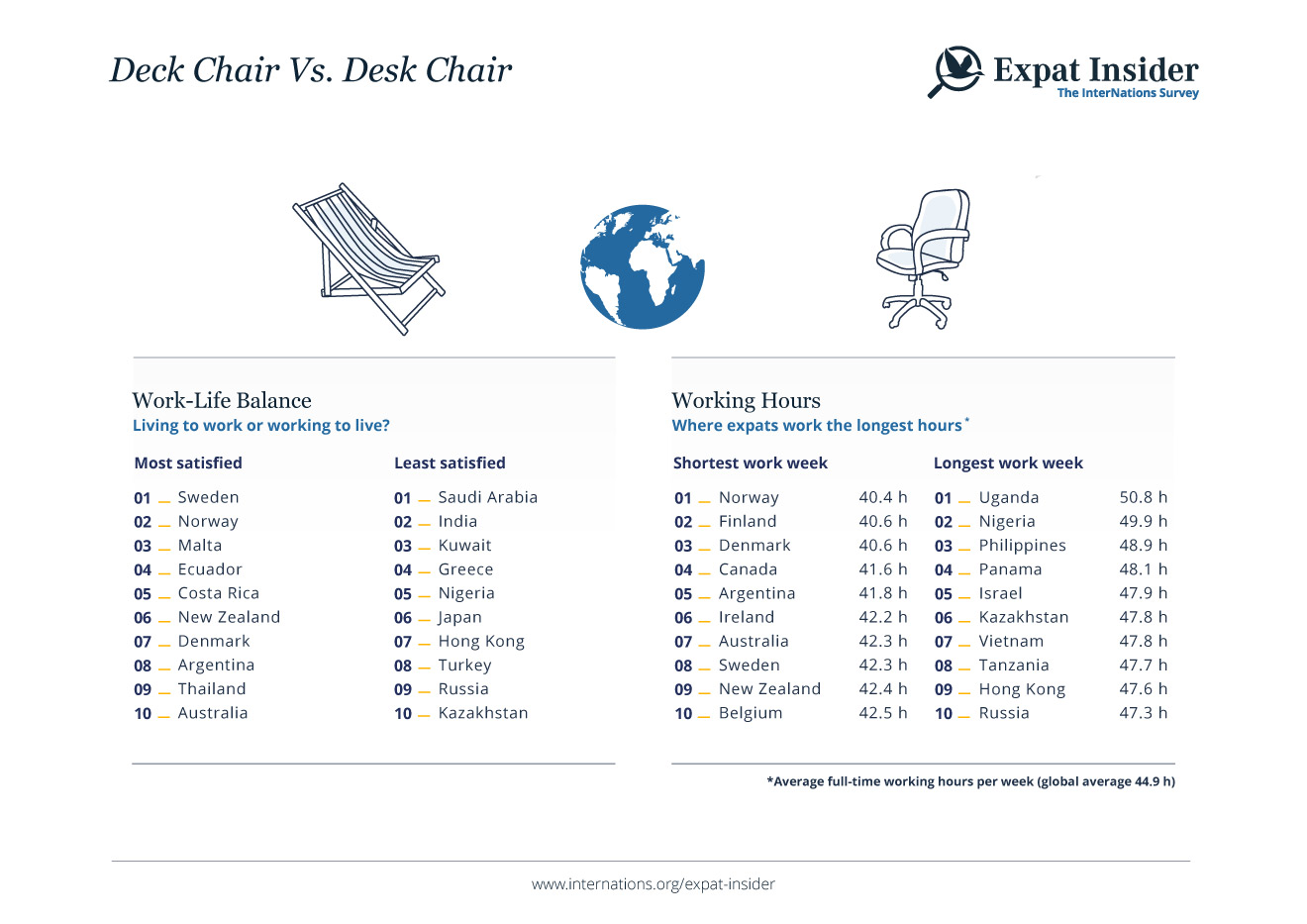All Work, No Play? Work-Life Balance & Working Hours
Expats in Norway are most satisfied with their work-life balance and work the lowest number of hours worldwide. Overall, it's expats over 50 who are happiest with their work life.
The Work-Life Balance subcategory combines expats' satisfaction with their overall work-life balance and their average working hours.
It turns out that there isn't much of a difference between male and female respondents when it comes to their overall happiness with either working hours or work-life balance, although men are just slightly more satisfied with both of these factors. However, it is the age group over 50 that has the highest percentages of expats completely satisfied with their work-life balance (21%) and working hours (22%). Among the other age groups, expats between 31 and 35 are happiest with these aspects.
In comparison to expats without kids, parents are just a bit happier with their work-life balance and weekly working hours. When it comes to expat types, the Dream Destination Expat (24% completely satisfied), the Adventurer (18% completely satisfied), and the Greener Pastures Expat (18% completely satisfied) are those who are most content with their work-life balance.
But how many hours do working expats actually spend at their job? And how many of them only work part-time?
Work & Leisure

Who Works the Most?
The average survey respondent works 42.0 hours per week, with 86% of participants working full-time (44.9 hours) and 14% in part-time jobs (23.7 hours).
Foreign Assignees work the most, with 46.1 hours per week, followed by Foreign Recruitees (44.7 hours) and Career Expats (44.1 hours). Traveling Spouses, on the other hand, only have a 34.6-hour workweek, which is not surprising considering that 39% of them work part-time, much more than the global average of 14%. Romantics (26%) and Dream Destination Expats (21%) also work part-time at an above-average rate. This shows in their weekly working hours as well: Romantics work 37.9 hours per week, on average, while Dream Destination Expats total 39.2 hours.
Expat parents only spend slightly less time at work than expats who don't have kids. Expat dads still work 45.7 hours per week full-time, and 26.1 hours if they have a part-time job. This is a lot more than expat moms who spend 43.1 hours or 22.9 hours at work, respectively. Even among the general survey population, men work slightly longer hours than women (44.2 vs. 39.7 hours). They are also a lot less likely to work part-time than women, with 90% of men working full-time compared to 82% of women.
Expats over the age of 50 are most likely to have cut back on their working hours, with only 79% of them working full-time, while those between 31 and 35 are most likely to work full-time (91%). On average, expats who are 51 and above also have the lowest number of working hours (41.0) per week. However, respondents from that age group work the longest hours (45.9 per week) if they still have a full-time job.
A Balanced Life in Scandinavia
Norway, Sweden, and Malta occupy the top ranks of the Work-Life Balance subcategory, while India, Greece, and Saudi Arabia are at the bottom. In Sweden, respondents are the happiest with their work-life balance, and Denmark comes in third for satisfaction with working hours, behind Norway and Sweden. On the other hand, when it comes to respondents' happiness with their work-life balance, or rather lack thereof, Kuwait occupies 62nd place, followed by India and Saudi Arabia, while expats in Turkey, Greece, and Chile are least satisfied with their working hours.
That Norway ranks first in the Work-Life Balance subcategory might also have something to do with its working hours. At 40.4 full-time working hours per week, survey respondents in Norway work a lot less than the global average (44.9 hours). Finland and Denmark are not far behind with 40.6 hours each. On the other hand, survey respondents spend the most time at work in Uganda, with 50.8 hours in total. The same tendency can be observed in Nigeria (49.9 hours) and the Philippines (48.9 hours).
In some countries, such as Costa Rica, Ecuador, and Malta, where expats are quite satisfied with their work-life balance, a lot of the respondents (up to 39%) say that they work part-time. While one could assume that it's easy to get along on a smaller paycheck there without sacrificing the quality of life, this is at least not the case for Costa Rica, where 50% of respondents give the cost of living a negative rating. Moreover, Greece has a fairly high number of part-time workers as well, yet respondents are rather unhappy with their work-life balance and working hours. Shorter working hours through part-time work do not necessarily seem to be the key to a good work-life balance - or to happiness in general.



